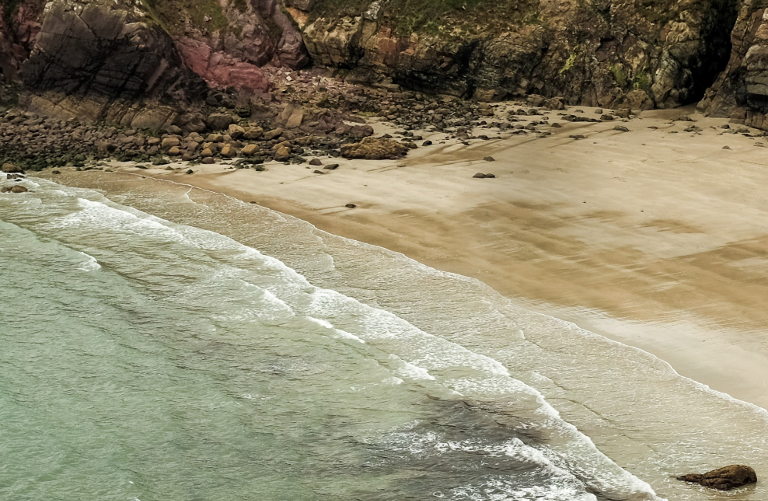I grew up on Cemaes Head, on Wales’s Irish Sea coast. The daughter of a lifeboatman I believe I was conceived within range of the sound of crashing waves at the mouth of the river Teifi (a notoriously difficult spot for seafarers). Like anywhere with a maritime history there were always stories. One legend in particular features a mermaid.
Fishing beneath the headland one day a fisherman called Peregrin finds a mermaid tangled in his nets. Begging to be released she promises to repay him. Years later, and true to her word, she reappears on a flat calm summer’s day to warn him of a fierce storm brewing. He heeds her warning but the skippers of the other herring boats laugh off his pleas to return to shore. Peregrin alone lives to tell the tale.
Whatever its original meaning my reading of this tale is the importance of respecting life in the water; the signs to look out for and what they communicate. Today our lives lack daily direct immersion in nature. But tuning in to our environments, observing them and how they speak to us, is a skill we urgently need to re-learn. We must remember how to work with nature, rather than resisting or dominating it, if we are to survive the climate and ecological crisis. To discard the nature-culture divide and move back to an understanding of ourselves as part of nature.
This is part of the motivation behind WOW Film Festival’s new initiative ‘Ecosinema’. The films are a mixture of documentary, storytelling and fiction from Iceland, the Amazon, Lebanon and Wales. They go beyond the usual ‘green’ documentaries towards stories that offer space to reflect on cultural ecology and an understanding of how humanity and nature are inextricably enmeshed. Each film reveals something different about people’s cultural relationships with, and understanding of, their environments.
‘The Last Forest’ is a hybrid documentary about the Yanomami and the fight to keep their culture intact in modern Brazil. ‘Under the Concrete’ is an exploration of the inner world of a scuba diver who finds respite from the clamour of Beirut in the calm of the underwater world. ‘Lobster Soup’ is a beautifully observed documentary about a fishing town’s much loved eatery increasingly under threat from global forces.
The possibility water has for revealing other worlds, and other ways of being in the world, is a prominent theme of ‘The Fairytale of Water’, which draws on many years of research into Welsh folk tales and legends by storyteller Peter Stevenson and filmmaker Jacob Whittaker, who are both from Ceredigion in West Wales. Specially commissioned for WOW ‘Ecosinema’ this short film is steeped in rebels, utopians, shapeshifters, as well as the contentious histories of damming and flooding Welsh valleys, giving a unique perspective on the place of water in Welsh cultural memory.
The first edition of Ecosinema has a strong current of stories that touch on people and water, rivers and seas. Why water? Water covers 70% of the surface of the planet and makes up about 60% of our human bodies, which take part in the global cycling of water from one kind of body to another. Water, as the great nature writer and marine scientist Rachel Carson understood, is a tangible way for humans to understand the vast interconnectedness of life.
In the ‘blue humanities’ a growing body of writers, sociologists and artists talk about water as a medium in which we can think differently, more creatively and be in community. Working (or thinking) with water promotes flexibility and resilience in a changing world. We often hear about the importance of emergent thinking and practices, to which I’d like to pose the question, “So what about submergence? What can immersion in water teach us?”
Ecosinema’s ‘Voices from the Water’ event brings together a diverse panel of researchers, activists and marine experts who possess a deeper understanding of water to respond:
“The world is shaped by the way we think about it, and I am trying to inspire people to think creatively so that we can find novel solutions to the things that need to change,” says social scientist Dr Luci Attala (University of Wales, Trinity Saint David) Water provides a medium to think with — it is an important part of physiology. To pay attention to what water is doing enables us to move into the future with care.”
On the ‘value’ of nature Mike Christie, professor of Environmental and Ecological Economics at Aberystwyth University says:
“We benefit from rivers in many ways: we extract drinking water, we fish, swim and kayak in and on rivers and enjoy watching wildlife that lives by rivers. These ‘ecosystem services’ are both direct and indirect and are often ignored in the decisions we humans make.”
David Jones, charity trustee for NARC (Neptune’s Army of Rubbish Cleaners), the UK’s first underwater clean-up group, says,
“My life is entwined with the ocean. I grew up in a small coastal village in West Wales, the son of a fisherman. Working in ocean sustainability for 20 years I discovered how our coasts and seas mean so much in so many ways. Providing food, transport, energy, tourism, health and wellbeing and a home for an array of wildlife.”
The wider ‘Ecosinema’ programme offers a chance to expand our collective consciousness around what we can do to care for the health of our waters and our world. And weather the storms to come.
Ecosinema runs at Aberystwyth Arts Centre between 16-18 September. The films and events will also be available online between 19-26 September. Ecosinema is an initiative of WOW ‘Wales One World’ Film Festival, which for 20 years has showcased the best of eye opening, thought provoking global cinema. See www.wowfilmfestival.com for the full programme.
Teaser Photo by Lukas Juhas on Unsplash Beach in Wales.





